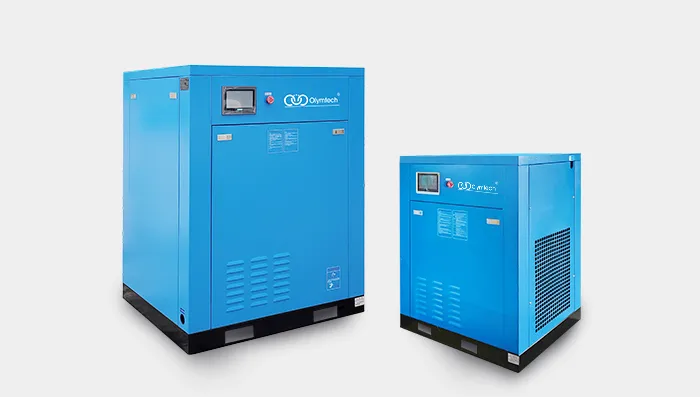Air compressors play a crucial role in various industries, powering tools, machinery, and equipment with pressurized air. From manufacturing plants to automotive repair shops, these machines are indispensable for efficient operations. However, not all air compressors are the same, and selecting the right type can significantly impact productivity and energy usage.
Choosing the right air compressor is more than just meeting your immediate air needs—it also affects long-term operational efficiency, energy consumption, and maintenance costs. Using a variable speed air compressor can provide substantial benefits in all these areas.

One of the biggest advantages of a variable speed air compressor is its energy efficiency. Traditional fixed speed compressors operate at full throttle, even when the air demand is low, leading to significant energy waste. In contrast, a VSD compressor adjusts its speed based on the current demand. When less air is needed, the compressor slows down, using less power. This translates into considerable energy savings, especially for operations with fluctuating air needs. Over time, this reduction in energy consumption can lead to a noticeable decrease in electricity costs.
Variable speed air compressors also experience less wear and tear than their fixed-speed counterparts. Because they adjust to the actual demand, they don’t constantly start and stop at full power, which reduces mechanical stress. This smoother operation leads to increased longevity of key components, minimizing the need for frequent repairs and replacements.
A variable speed air compressor can precisely match air output to demand, ensuring a more consistent and reliable performance. This makes it ideal for applications where air demand varies throughout the day. Whether your operation experiences sudden spikes or gradual changes in air needs, a VSD compressor can easily adapt, providing the exact amount of air required without wasting energy.
With less wear and tear and more efficient operation, variable speed air compressors lead to lower overall operating costs. Reduced energy bills, fewer repairs, and extended machine lifespan all contribute to significant savings over time. Additionally, the reduction in maintenance needs leads to less downtime, ensuring higher productivity and smoother operations.
Fixed speed compressors tend to run at higher speeds and produce more noise, which can be disruptive in a work environment. Variable speed compressors, on the other hand, tend to run quieter due to their ability to operate at lower speeds when demand is reduced. This not only improves the work environment but also reduces noise pollution in facilities.
Variable speed air compressors are particularly beneficial for industries where air demand varies throughout the day. For example, manufacturing facilities, food processing plants, and automotive repair shops often experience fluctuating air needs. In such environments, a VSD compressor ensures the air supply is always at an optimal level, preventing waste and improving efficiency.
Businesses that experience seasonal or cyclic operations can also greatly benefit from variable speed compressors. For example, industries that increase production during specific seasons or product cycles can adjust their air compressor output accordingly, avoiding unnecessary energy consumption during slower periods.
In today's world, businesses are increasingly focused on reducing their environmental impact. Companies prioritizing energy efficiency and sustainability can use variable speed air compressors to minimize their carbon footprint. By reducing energy waste, they not only lower operating costs but also contribute to global sustainability efforts.
One potential drawback of variable speed air compressors is the higher upfront cost compared to fixed-speed models. The advanced technology and flexibility of a VSD system come at a price. However, this initial investment should be viewed in the context of long-term savings.
While the upfront cost of a VSD compressor is higher, the energy savings, reduced maintenance, and extended lifespan provide a fast return on investment (ROI). Depending on the application, businesses may see substantial savings on energy costs within a few years, making it a cost-effective solution in the long run.
Before selecting a variable speed air compressor, it’s important to assess your facility’s air demand profile. Understanding when and how much air is needed throughout the day ensures you choose a compressor that can efficiently handle your operational requirements.
Choosing the right size and capacity for your compressor is crucial. A compressor that’s too small won’t meet demand, while one that’s too large may lead to wasted energy. Working with a trusted supplier can help ensure you select the optimal unit for your specific needs.
When investing in a variable speed air compressor, consider the ease of maintenance and service. Many models come with warranties and service packages, which can make routine maintenance more manageable and help extend the life of the machine.
Variable speed screw air compressors offer significant advantages, including improved energy efficiency, reduced wear and tear, lower operating costs, and quieter operation. These features make them an ideal choice for businesses looking to optimize their air compressor performance.
For companies with fluctuating air demand, energy-conscious goals, or a need for precision, a variable speed air compressor is the smart choice. While the initial investment may be higher, the long-term savings in energy and maintenance costs make it a worthwhile decision. By selecting the right compressor for your needs, you can boost efficiency, reduce operational costs, and enhance overall productivity.
By continuing to use the site you agree to our privacy policy Terms and Conditions.